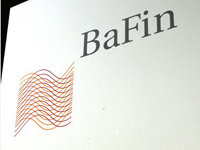Politics
BaFin criticizes banks
 The Bonn-based Federal Financial Supervisory Authority (BaFin) has given several German banks a bad grade in terms of risk spreading, reports Financial Times Deutschland (FTD). With a mark of “four”, the banks had just avoided sanctions, i.e. fines. The names of the banks concerned were not disclosed. The supervisory authority had required one bank to correct the defects within three months. If this were not done, it would have to hold more equity. Since last December, the banks have been obliged to consider whether new risks have been added to their portfolio and how big the scope for new business is.
The Bonn-based Federal Financial Supervisory Authority (BaFin) has given several German banks a bad grade in terms of risk spreading, reports Financial Times Deutschland (FTD). With a mark of “four”, the banks had just avoided sanctions, i.e. fines. The names of the banks concerned were not disclosed. The supervisory authority had required one bank to correct the defects within three months. If this were not done, it would have to hold more equity. Since last December, the banks have been obliged to consider whether new risks have been added to their portfolio and how big the scope for new business is.
Bank levy still controversial
 In mid-June, the Bundesrat voted on details of the new bank levy. Until recently it was controversial whether the small credit unions and savings banks should participate in the levy. The Länder finance ministers had agreed in advance of the vote that banks with relevant liability under €500 million should be exempted from the levy. The maximum charge in this context was raised from 15 percent to 18 percent of average earnings for the previous five years. To prevent big banks from accounting themselves as poor, losing years are to be zero weighted. The funds accruing, an estimated one billion euros a year, will flow into a crisis fund, from which wrecked financial institutions are to be supported in the future. The state of Hesse wants to eliminate the exemption and has raised constitutional concerns about the minimum threshold for small institutions. The allowance also meets resistance from the Federal Finance and Justice ministries.
In mid-June, the Bundesrat voted on details of the new bank levy. Until recently it was controversial whether the small credit unions and savings banks should participate in the levy. The Länder finance ministers had agreed in advance of the vote that banks with relevant liability under €500 million should be exempted from the levy. The maximum charge in this context was raised from 15 percent to 18 percent of average earnings for the previous five years. To prevent big banks from accounting themselves as poor, losing years are to be zero weighted. The funds accruing, an estimated one billion euros a year, will flow into a crisis fund, from which wrecked financial institutions are to be supported in the future. The state of Hesse wants to eliminate the exemption and has raised constitutional concerns about the minimum threshold for small institutions. The allowance also meets resistance from the Federal Finance and Justice ministries.
Higher capital ratios in Basel III
The Basel Committee agreed in late June on higher capital ratios for big banks. In addition to the hard core capital ratio (Tier I) already agreed under Basel III regulations of seven percent, large banks should therefore hold a risk buffer of from 1.0 to 2.5 percentage points. Only issued shares and retained earnings are counted towards core capital here. These are placed in relation to risky assets. The criteria for the definition of a major bank are the amount of total assets, global networking in the financial system and outstanding loan obligations. While Commerzbank could get off with a buffer of 1.0 percent, analysts estimate that the German bank must as a so-called Sifi (Systemically Important Financial Institution) hold up to 2.5 percent in capital buffers. In mid July the Financial Stability Board (FSB) is to identify the system-relevant banks, to which the regulation will apply. A list of up to 30 institutions is expected, of which the eight most important ones, including Deutsche Bank, are to hold a risk buffer of 2.5 percent. France advocates a longer list. A final decision will be made at the G20 summit in Cannes in early November. The more stringent capital requirements will according to Mediobanca analysts in London mean that the seven largest European banks, including Deutsche Bank, Unicredit, BNP Paribas, Société Générale, Banco Santander and Credit Suisse, will have to increase their equity capital. Mediobanca estimates the volume of the increases at €62 billion. The need at Deutsche Bank alone is estimated to be 3.5 billion euros. While the financial industry has time until 2019 to meet the capital requirements, investors expect the requirements to be already fully met from 2013, the date of the gradual introduction of the regulations.
Insurers fight Solvency II
EU Internal Market Commissioner Michel Barnier is fighting against the concerns of the European insurance sector about the new Solvency II rules. These provide for new capital and oversight rules for the insurance industry. Basically, those insurance companies that have equity investments and thus higher risks should hold even more capital. The industry criticizes the new rules as too complex and calls for an acclimatization period, while the requirements are monitored but not sanctioned. Barnier, however, decided the rules should enter into force punctually on 1 January 2013. The EU Commission could at most create transitional rules. The Executive Director of European insurance oversight body EIOPA, Carlos Montalvo Rebuelta, has advocated such a transitional rule at a conference.
New bank stress testing controversy
 The head of the European Banking Authority EBA established at the beginning of the year, Andrea Andria, is standing in the crossfire. On the one hand, the banking associations complain the recently applied criteria for credit institutions’ stress resistance are exaggerated. Analysts, on the other hand, warn that the stress test on the banks may again be too lax and so set the credibility of the authority at stake. The EBA is currently testing 91 European banks for their vulnerability to crisis. In addition to a Europe-wide recession, a slump in the housing and stock markets and a sharp rise in interest rates are being simulated. If a bank’s core capital ratio falls below five percent in the test, it is considered failed and the bank needs to raise new capital. According to Reuters, rumours have it that around 15 banks, if possible from several different countries, are to fail the test, to make it more credible and effective. In the first stress test last year, Irish banks came through the test without difficulty, although they collapsed a short time later. Among the 91 banks tested, 14 are German, of which Helaba and Nord/LB are regarded as shaky candidates. A result of the test is expected in mid July. The head of the Federal Financial Supervisory Authority (BaFin), Jochen Sanio, criticized the stress test criteria applied as too harsh, and even accused the EBA of breaking the law because it put forward new equity capital definitions without legitimacy. Although Basel III demanded new capital rules only for 2019, the EBA is already asking the banks for five percent hard equity capital. The German banking associations too accused the EBA of technical and logical errors.
The head of the European Banking Authority EBA established at the beginning of the year, Andrea Andria, is standing in the crossfire. On the one hand, the banking associations complain the recently applied criteria for credit institutions’ stress resistance are exaggerated. Analysts, on the other hand, warn that the stress test on the banks may again be too lax and so set the credibility of the authority at stake. The EBA is currently testing 91 European banks for their vulnerability to crisis. In addition to a Europe-wide recession, a slump in the housing and stock markets and a sharp rise in interest rates are being simulated. If a bank’s core capital ratio falls below five percent in the test, it is considered failed and the bank needs to raise new capital. According to Reuters, rumours have it that around 15 banks, if possible from several different countries, are to fail the test, to make it more credible and effective. In the first stress test last year, Irish banks came through the test without difficulty, although they collapsed a short time later. Among the 91 banks tested, 14 are German, of which Helaba and Nord/LB are regarded as shaky candidates. A result of the test is expected in mid July. The head of the Federal Financial Supervisory Authority (BaFin), Jochen Sanio, criticized the stress test criteria applied as too harsh, and even accused the EBA of breaking the law because it put forward new equity capital definitions without legitimacy. Although Basel III demanded new capital rules only for 2019, the EBA is already asking the banks for five percent hard equity capital. The German banking associations too accused the EBA of technical and logical errors.















